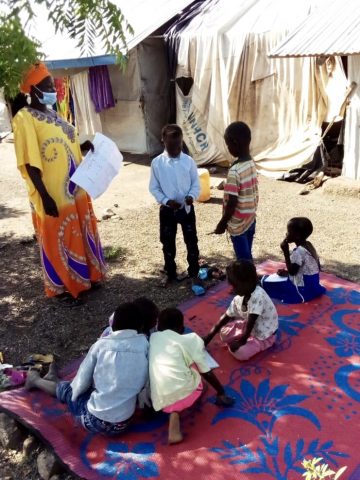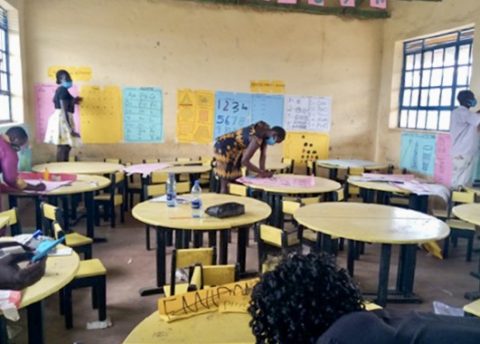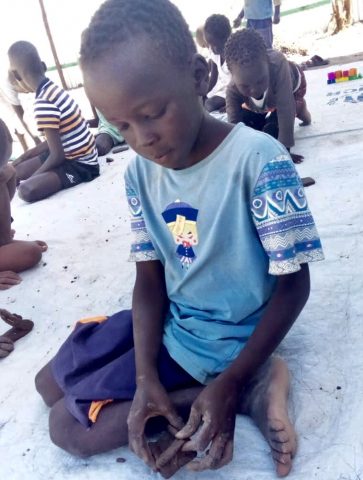Training teachers in Early Childhood Development boosts learning in Kakuma refugee camp, Kenya
Teacher training in collaboration with UNICEF Kenya is an immense support to teachers of children in Kakuma refugee camp. Quality education with psychosocial support ensures that no one is left behind.

Teacher Hellen Okang supports small groups of learners with home learning during school closures. Photo: FCA
Young children can only thrive when learning in a conducive environment that prepares them to unleash their potential at an early age. Thus, their teachers require specialised training.
In collaboration with UNICEF Kenya, Finn Church Aid (FCA) put together a practical Early Childhood training that serves both young children and their families in Kalobeyei settlement in Kakuma refugee camp. The training was developed with Finnish teachers through the volunteer network Teachers without Borders.
The training focused on Early Childhood Development and Education (ECDE) pedagogy and didactics for pre-school teachers, targeting 25 teachers across five ECDE centres in the settlement and improving the quality of education for 3,555 learners enrolled in the ECDE centres.
Teacher Hellen Okang, 29, from South Sudan taught 125 learners at Joy Primary school in Kalobeyei before the Covid-19 pandemic disrupted learning in schools. Hellen participated in the training conducted in August and September 2020 and says it benefitted her immensely by improving her teaching skills.

Teachers developing teaching materials for the ECDE centres in Kakuma. Photo: FCA
The training provided teachers with practical skills suited for crisis contexts and covered positive ways of disciplining children, curriculum and lesson planning, children’s rights, supporting numeracy and literacy skills, communication between teachers and caregivers and embracing a multicultural classroom.
“I began teaching in 2018 as a volunteer teacher. This training has gone a long way in helping me understand my learners and what it means to teach children in pre-school”, Hellen says.
The teacher training opened eyes for psychosocial support
The children that Hellen teaches have continued learning from home during school closures caused by the Covid-19 pandemic. 8-year-old James has tuned into radio lessons together with Hellen, who also is his neighbour. Teachers in the settlement complement the radio lessons by visualising the content on blackboards, helping learners to understand the lessons with recaps and following up on their homework.
“I would like to be a doctor to treat the sick when I grow up,” James says when asked about his dreams.

8-year-old James learns by playing and says he thinks his teacher Hellen is very welcoming and approachable. Photo: FCA
James’ mother Rose Aiira, describes her son as a soft-spoken boy who is quick and eager to learn new skills. When he enrolled in school in 2018, James only spoke his native South Sudanese language. Now thanks to teachers who speak his language as well as Arabic and English, he has drastically improved his language skills, particularly in Arabic. He also has friends of different nationalities, which supports his learning.
Teachers also use visual aids to help the children understand what they teach. The ECDE training emphasised the use of play as a method of practical content delivery and creating innovative ideas on developing attractive teaching and learning materials to capture the attention of learners.
“My learners love counting with songs. I cannot teach math without it”, Hellen emphasised.
Hellen says that the training opened her eyes to the importance of nurturing and caring for the children. According to her, she can now identify the psychosocial needs of learners and respond to them.
“I now understand each child uniquely, as individuals, and when they need stronger support I can refer them to the appropriate counselling service”, Hellen says.
Text: Elizabeth Oriedi, Catherine Angwenyi
In Kakuma Refugee camp in Kenya, Finn Church Aid together with UNICEF Kenya, supports 3,555 learners in six Early Childhood Development and Education centres and 7,992 learners in five Primary schools with access to education, teacher training and distance learning during the Covid-19 pandemic.